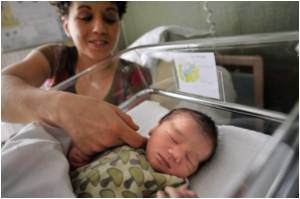A significant decline in the rate of cesarean section (C-section) births in Portugal, reports a new study.

C-section rates have been on the rise around the world, which has drawn international attention and concern, given the potential adverse effects to the health of mother and baby. Prior research shows that cesarean birth is linked to greater risk of blood clots (thromboembolism), hemorrhage, and infection in mothers. Furthermore, it increases the risk of newborn respiratory complications, obesity, diabetes, and a propensity to develop allergies in childhood.
Prof. Diogo Ayres-de-Campos at the Medical School of the University of Porto in Portugal explains, "In European countries with low cesarean birth rates, very low mortality rates in mother and child are also reported. Our study describes a concerted effort carried out in Portugal to reduce C-section rates, and evaluates its impact on obstetric indicators."
For the present study the research team used national data on births, C-sections, perinatal and maternal mortality between 2000 and 2014. Rates of instrumental vaginal delivery, vaginal birth after cesarean (VBAC), hypoxia-related complications and perineal tears were also retrieved from state-owned hospitals.
From 2000 through 2009 the C-section rate in Portugal rose steadily, reaching a maximum of 36.6%. After the concerted action that started in early 2010, a significant decline to 33% was registered in the following years. During the entire period perinatal mortality also declined, while maternal mortality remained stable. In the last few years the team also observed a significant increase in operative vaginal delivery (use of forceps or vacuum) and vaginal birth after cesarean (VBAC), while newborn complications due to lack of oxygen (hypoxia) decreased.
"Our findings suggest that the intensive efforts carried out by Portuguese authorities that included sharing of information, training of healthcare professionals, and including C-section rates in the criteria for hospital funding may have been responsible for the changes observed across the country," concludes Prof. Ayres-de-Campos. "Similar efforts in countries that have high C-section rates such as the US, China, Italy, Turkey, and many others in Latin America, may prove an effective way to reduce the excessive use of this operation, and thus decrease the risks associated with delivery for both mother and child."
 MEDINDIA
MEDINDIA




 Email
Email




